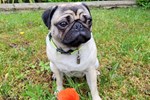Search - Research
1 - 10 of 583 results
-
VetCompass exceeds 4 million animals!
The VetCompass programme continues to grow and, as of March 2015, now holds data on over 4 million animals! SPECIES No. UNIQUE ANIMALS Canines 1,981,111 Felines 1,369,548 Rabbits 338,485 … -
VetCompass at Veterinary Evidence Today 2016
At the start of November, RCVS Knowledge hosted the second international evidence-based veterinary medicine (EBVM) network conference, Veterinary Evidence Today 2016, in Edinburgh. The programme featured an array of informative EBVM-themed lectures …At the start of November, RCVS Knowledge hosted the second international evidence-based veterinary …
-
VetCompass at Veterinary Evidence Today 2016
At the start of November, RCVS Knowledge hosted the second international evidence-based veterinary medicine (EBVM) network conference, Veterinary Evidence Today 2016, in Edinburgh. The programme featured an array of informative EBVM-themed lectures … -
VetCompass osteosarcoma research appears in this month's Northern Ireland Veterinary Today
Osteosarcoma is a painful and aggressive bone tumour in dogs that is known to be more common in certain breeds than others. New research has now confirmed that larger breeds, such as Rottweiler, Great Dane and Rhodesian Ridgeback, have a greater … -
Butterfly documentary filmed at SML
The Structure and Motion Lab has had a two-day visit from French film makers of Peaks et Trames Production. They are working on a set of four documentaries about great aerial migrations with independent documentary production company La Compagnie … -
Early Jurassic dinosaur shifted from four legs to two legs as it grew up
Scientists have discovered that an early species of dinosaur, Mussaurus patagonicus, could only move on four limbs once born but switched to two legs as it grew up, just as humans do. -
Coming along in leaps and bounds – crocodiles can gallop but alligators can’t, new study finds
It’s a motion more closely associated with horses, but researchers have found that more species of crocodiles can gallop than previously thought. The study, which was led by the Royal Veterinary College (RVC), also discovered that by contrast … -
Can Autophagy help in the fight against diseases?
Leading academics met in London to discuss research that hopes to one day find the key to fighting diseases such as cancer and dementiaLeading academics met in London recently to discuss research that hopes to one day unlock the key …
-
Can mosquitoes stop us going bump in the night?
International, collaborative research group led by the Royal Veterinary College (RVC) has demonstrated how the mosquito avoids obstacles in the dark by sensing changes in the airflows generated by its flapping wings. -
New research shows Pugs have high health risks and can no longer be considered a ‘typical dog’ from a health perspective
A new study from the Royal Veterinary College suggests urgent action is needed as many health issues of Pugs are associated with their extreme body shape New research from the Royal Veterinary College (RVC) has revealed that the health of Pugs in …

_crop.png?v=638497413095592974)






